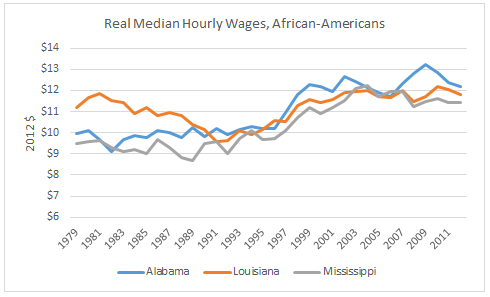There's a ton of interesting analysis out in recent days on the quite explicit though often under-appreciated economic thrust of the March on Washington that took place half-a-century ago today.
I found economist Joe Stiglitz's discussion of Dr. King's influence on his work to be particularly resonant. As I pointed out here, a seminal part of my own education in this regard was recognizing the importance of full employment in boosting racial economic outcomes, and learning how important this connection was to Dr. King's own work, both in the 1963 March and even more so in the Poor Peoples' Campaign he led a few years later.
Stiglitz and others note the lack of black progress on many key variables: income, poverty, wealth, employment. Richard Reeves adds an important and trenchant analysis of the black mobility gap. I agree with these facts, but want to add an additional, simple point which is in danger of getting overlooked: the evidence shows the Dr. King was right. Full employment is a substantial part of what it will take to achieve economic justice.
As I've documented in lots of places, full employment labor markets have been the exception, not the norm, over the past 30 years: "between 1949 and 1979 the market was at full employment over two-thirds of the time. Since then, it has been at that level just a third of the time."
But there was this period in the mid-to-late 1990s when the jobless rate hit new lows, bottoming out at 3.8 percent in April of 2000. I very much urge the folks writing about blacks' lack of economic progress to apply their forensics to that period. All else equal, which all else never is, it provides a test of King's theory that while enforced anti-discrimination measures were essential, very strong labor demand is equally essential.
Look, for example, at the figure below. It shows real median hourly wages of African-Americans in three Southern states, Alabama, Louisiana, and Mississippi. And it also shows that the only progress made by middle-wage African-Americans in terms of real wages was in the period when the national job market was moving towards full employment. Labor markets tightened up to some degree in both of the other expansions covered by the years in the figure -- the 1980s and the 2000s recoveries. Yet in neither of those periods did black median wages get any traction.

Source: EPI analysis of CPS data.
This is, of course, cursory analysis, but it is no doubt instructive. You may accuse me of dreaming if I think we're getting back to 4 percent unemployment anytime soon, especially with a Congress that has if anything, been pushing the wrong way on the economy. But if you ask me, today is a very good day to have a progressive dream.
This post originally appeared at Jared Bernstein's On The Economy blog.
